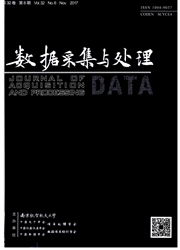

 中文摘要:
中文摘要:
Using ultrasonic guided waves to assess long bone fractures and fracture healing has become a promising diagnostic issue.But the multimode overlap of the guided waves challenges the quantitative evaluation and clinical application.In the preformed study,in order to simplify the signal interpretation,the low-frequency sinusoidial signals were used to only excite S0 and A0 modes in fractured long bones.The amplitudes of S0 and A0 modes were numerically analyzed with variation in crack width and fracture angle.Numerical simulation,based on the two-dimension finite-difference time-domain(2D-FDTD) reveals that both S0 and A0 amplitudes decrease with the fracture widening.However,the increase in fracture angle gradually enhances the A0 amplitude,while with respect to the S0 mode,its amplitude shows a non-monotonic trend to the variation in fracture angle with a turning point around 45°.The amplitude ratio between S0 and A0 can reflect the variations in crack width and fracture angles.The simulation illustrates that ultrasonic guided S0 and A0 modes are sensitive to the degree of both vertical and oblique fractures in the long cortical bone.These findings may be helpful for fractures diagnosis and healing evaluation of the long bone.
 英文摘要:
英文摘要:
Using ultrasonic guided waves to assess long bone fractures and fracture healing has become a promising diagnostic issue. But the multimode overlap of the guided waves challenges the quantitative evaluation and clinical application. In the preformed study, in order to simplify the signal interpretation, the low-frequency sinusoidial signals were used to only excite SO and A0 modes in fractured long bones. The amplitudes of SO and A0 modes were numerically analyzed with variation in crack width and fracture angle. Numerical simulation, based on the two-dimension finite-difference time-domain (2D-FDTD) reveals that both SO and A0 amplitudes decrease with the fracture widening. However, the increase in fracture angle gradually enhances the A0 amplitude, while with respect to the SO mode, its amplitude shows a non-monotonic trend to the variation in fracture angle with a turning point around 45°. The amplitude ratio between S0 and A0 can reflect the variations in crack width and fracture angles. The simulation illustrates that ultrasonic guided SO and A0 modes are sensitive to the degree of both vertical and oblique fractures in the long cortical bone. These findings may be helpful for fractures diagnosis and healing evaluation of the long bone.
 同期刊论文项目
同期刊论文项目
 同项目期刊论文
同项目期刊论文
 A Base-Sequence-Modulated Golay Code Improves the Excitation and Measurement of Ultrasonic Guided Wa
A Base-Sequence-Modulated Golay Code Improves the Excitation and Measurement of Ultrasonic Guided Wa Assessment of the Fundamental Flexural Guided Wave in Cortical Bone by an Ultrasonic Axial-Transmiss
Assessment of the Fundamental Flexural Guided Wave in Cortical Bone by an Ultrasonic Axial-Transmiss The relationship between ultrasonic backscatter and trabecular anisotropic microstructure in cancell
The relationship between ultrasonic backscatter and trabecular anisotropic microstructure in cancell Analysis of apparent integrated backscatter coefficient and backscattered spectral centroid shift in
Analysis of apparent integrated backscatter coefficient and backscattered spectral centroid shift in The analysis and compensation of cortical thickness effect on ultrasonicbackscatter signals in cance
The analysis and compensation of cortical thickness effect on ultrasonicbackscatter signals in cance Joint spectrogram segmentation and ridge-extraction method for separating multimodal guided waves in
Joint spectrogram segmentation and ridge-extraction method for separating multimodal guided waves in Correlation between the combination of apparent integrated backscatter–spectral centroid shift and b
Correlation between the combination of apparent integrated backscatter–spectral centroid shift and b Experimental observation of cumulative second-harmonic generation ofLamb waves propagating in long b
Experimental observation of cumulative second-harmonic generation ofLamb waves propagating in long b Axial transmission methodfor long bone fracture evaluation by ultrasonic guided waves: Simulation, p
Axial transmission methodfor long bone fracture evaluation by ultrasonic guided waves: Simulation, p 期刊信息
期刊信息
